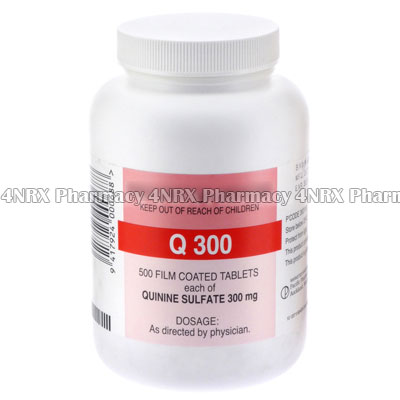 |
Home  General Health General Health  Quinine Sulphate Quinine Sulphate |
|
|||||||||
|
|
Quinine Sulphate
What is Quinine Sulphate used for? Quinine Sulphate is an oral medication used to treat patients suffering from malaria. It operates by killing the parasites living in the blood cells or other body tissues. It may also be useful for treating leg cramps caused by arthritis or diabetes. Your physician may prescribe it to treat other unlisted conditions, as well. How should I use Quinine Sulphate? Quinine Sulphate should always be used according to your physician's instructions to get the most effective results from treatment. The normal dosage is one tablet taken every eight hours for five to seven days, but your particular instructions will depend on the condition being treated, your current health, and the severity of your symptoms. Swallow the tablets whole with a large glass of water and a meal to prevent nausea. Do not split, crush, or chew the medicine prior to use as this may destroy or alter the effects of their contents. It is also not recommended to stop using the medicine prior to being told to do so as the infection may not be destroyed and can return. Ask your physician any questions you have about using the medicine to ensure the correct administration. What are the side effects of Quinine Sulphate? Side effects associated with the use of Quinine Sulphate include:
More serious side effects that may require medical attention are sensitive skin, easier bruising, leg pain, chest pain, severe headaches, faintness, numbness on one side of the body, low blood sugar, flu symptoms, lower back pain, severe vision problems, chest pain, trouble breathing, severe skin reaction, coughing up blood, darkened urine, discolored stools, or jaundice. Inform your physician about any conditions you experience that are intense or worrying to make sure the correct alterations are made to your regimen to prevent further problems. Please Note Do not begin using Quinine Sulphate to treat leg clamps in pregnant women or if you have tinnitus, myasthenia gravis, optic neuritis, or blood appearing in the urine. Also disclose if you have atrial fibrillation, heart block, heart disease, or a G6PD deficiency as these conditions may cause complications during treatment requiring alterations to your regimen. Strictly follow all instructions provided to you by your physician or pharmacist while using Quinine Sulphate. Optimum and safe dosage can differ based on the patient and the condition being treated. As this medication may be unsafe for certain patients, it is essential you always inform your physician if you are pregnant or breastfeeding, as well as if you have any allergies, other illnesses, or ongoing health conditions, and if you are taking any other form of medication, supplements, or herbal products. Immediately seek emergency medical care if you have an allergic or hypersensitive reaction. Common signs of a reaction include hives, swelling, skin rashes, chest pains, as well as trouble breathing or swallowing. 
|
||||||||||||||||||||||